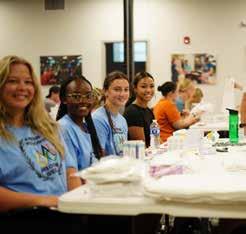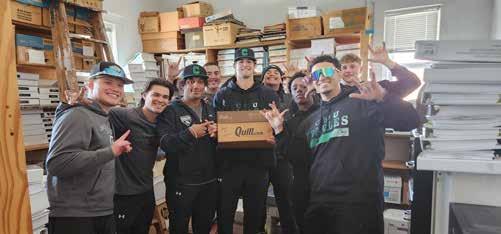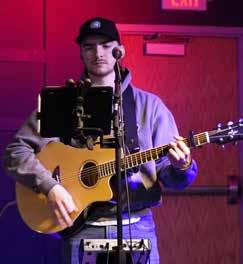
5 minute read
Rooted in FAITH Committed to EXCELLENCE
By Emily Kesel
As far back as the signing of its charter in 1853, Central Methodist University – though it has gone by several names in the intervening years – has been the pillar of higher education for the Methodist population of the great state of Missouri. Central was, by design, the “one college of the highest order” in the state, built midway between the two largest population centers so that it would be equally accessible to all who wished to pursue a Wesleyan education.
Today, CMU continues to provide that same accessibility and excellence and has become a model of a United Methodist college. Early this year, Central underwent evaluation by the University Senate of the United Methodist Church, which found the University to be an outlier among its peers.
“The evaluators called us the example of what it means to be a United Methodist related institution,” said Dr. Roger Drake, president of the University. “They were very complimentary of all the things we do with the Center for Faith and Service, as well as the financial safety of the college.”
President Drake and other University officials welcomed evaluators to campus this semester, after submitting paperwork to the accrediting body whose purpose is to “maintain the standards of United Methodist-related education, ensuring that our institutions are functioning at a high level of excellence in all areas of strategy and operation including church-relatedness, program quality, financial integrity and stewardship, and governance.”
Central was found to be not only meeting but in many cases surpassing the University Senate guidelines for maintaining standards of excellence for a United Methodist school, especially where it comes to church-relatedness.
At the center of CMU’s Christian practices, as well as at the center of the campus, is Linn Memorial United Methodist Church, which houses Assembly Hall and the Center for Faith and Service (CFS). These institutions make up the backbone of religious life at Central, as the campus community is invited to Chapel services every Tuesday morning for devotion and fellowship led by the campus chaplain – currently Rev. Scotty Wall – and featuring student musicians and future worship leaders.





Appointed and paid by the Methodist Conference, the chaplain leads the CFS and works alongside the Religious Life Committee to coordinate religious programming and activities, such as Bible studies and appearances by guest speakers. The pastors of Linn and St. Paul UMC also serve on this committee and play various roles in furthering the religious life of Central’s students and community.
Rev. Bill O’Neal, current Linn UMC pastor, also serves as a major gift officer for Central’s office of advancement and alumni relations. In addition to his day-to-day roles, O’Neal has also led students on multiple mission trips and taught courses on emergency response, lending to the community service aspect of Central’s own mission. His connections to UMC leaders in the state have also been instrumental in forging a partnership with the UNITE youth conference, which brings hundreds of young people to campus each summer for a week of faith-based activities.
Many of these offerings and aspects of the CMU experience meet the University Senate requirements of creating a community of scholarship and learning which facilitates social justice, but perhaps none more so than the Building Bridges program, through which Central offers college coursework to incarcerated persons across the state. True to the Wesleyan roots of the college, the program allows incarcerated students to earn degrees in business, helping to reduce recidivism and offering a “second chance” to those in need.
Of course, Central also offers its own religious course of study. While all students are required to complete at least one religion course as part of the general education requirements, courses are also offered as electives and as part of the majors in religion and church leadership or comparative religion and philosophy. Students who earn degrees in these fields go on to become church leaders, non-profit organizers, ministers, and various other professions, often studying at prolific UMC seminaries after graduating from CMU.

While Central is proud to offer and support so many opportunities for religious study and practice, Drake believes that it is all the other aspects of a CMU liberal arts education that make it the ideal way to pursue a degree.
“From a mission standpoint, I don’t think that there is a better way to educate a student in a religious affiliated college than we do as Methodists,” he said. “If a student wants to come here and graduate without ever being influenced in any way by our United Methodist connection, they could choose to do that. If, on the other hand, a student wanted to come and be completely immersed in Wesleyan thought, they could do that as well.
“If they want to choose anywhere else on that spectrum, there’s the option to do that here, completely voluntarily,” Drake added. “I think that’s just a more excellent way to educate people.”





